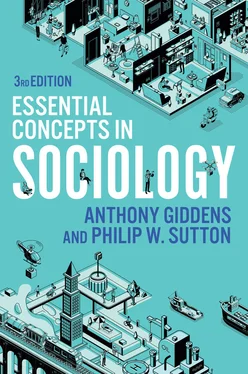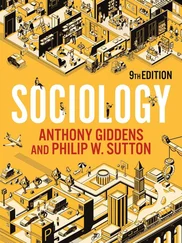The digital transformation in communications is clear, but whether this constitutes a genuine ‘revolution’ can be queried. As Zuboff points out, for all the novel applications we have seen so far, capitalist profit-seeking continues to be the main driver of socio-economic change and the industrialized societies remain recognizable as such. After all, industrial production is still required to manufacture microchips, tablets, smartphones, robots and computers, and it may be more realistic to see the current phase as a continuation of industrialization, with its characteristic replacement of human and animal labour by machines.
Inequalities of internet access and ownership of digital devices are described today as digital divides, but these are still marked by existing inequalities of disability, class, gender, race and ethnicity (Andreasson 2015). Early adoption of digital technology was largely across the Global North, which reinforced existing global inequality, though the gap between North and South is gradually closing. Digitization may be ‘revolutionary’ in some respects, but it does not seem to be changing long-established patterns of social inequality. Others accept that digitization may have revolutionary consequences but see these as, on balance, negative, leading to social isolation and a denuded human experience. The idea of online experience as somehow ‘not real’ is a common refrain among digital critics.
The continuing relevance of the concept of a digital revolution should already be clear. However, it is worth noting that contemporary debates have moved beyond simple positive / negative evaluations of digitization. More recent studies reject the idea that cyberspace is essentially different or divergent from the material social world. Empirical studies show that online life is not a denuded form of the material world, but more likely an extension of it. This is clear in research into social media, where it has been found that most people’s interactions are generally with existing friends, relations and people they already know from face-to-face contact, not with strangers and anonymous, ethereal ‘profiles’. Similarly, Baym (2015) argues that a more realistic account shows that relationships today flow from online to offline and vice versa, and, as digital technologies become increasingly embedded within our everyday routines, this is exactly what we might expect.
For sociologists, the digital revolution raises the question of whether existing ways of carrying out research are appropriate for the study of interactions in online environments. Do we now need novel research methods and tools? Selwyn (2019: 2) addresses this issue directly, arguing that, in fact, what we need is a ‘proactive “digital” approach toward all aspects of sociological work’. This is because all social settings have become ‘profoundly digital and digitized’. For example, communications routinely involve texting, email and social media, while many leisure pursuits and entertainment forms, such as gaming, watching films or TV and listening to music, take place online. Scholars working on social and government policy cannot now ignore the vast digital bureaucracies through which education, health and welfare are delivered and accessed. In the future, analysis of the enormous amount of data collected via the Internet of Things may tell us much more about how social life is actually lived than conventional methods such as interviews, focus groups and surveys. In sum, Selwyn’s overall argument is that developing a digital sociology is not an esoteric project pursued by a small number of technology geeks, but is absolutely essential if sociology is to be relevant in the digital age.
References and Further Reading
Andreasson, K. (ed.) (2015) Digital Divides: The New Challenges and Opportunities of e-Inclusion (Boca Raton, FL: CRC Press).
Athique, A. (2013) Digital Media and Society: An Introduction (Cambridge: Polity).
Baym, N. K. (2015) Personal Connections in the Digital Age (2nd edn, Cambridge: Polity).
Castells, M. (2006) The Network Society: From Knowledge to Policy (Baltimore: Johns Hopkins University Press).
— (2015) Networks of Outrage and Hope: Social Movements in the Internet Age (2nd edn, Cambridge: Polity).
Negroponte, N. (1995) Being Digital (London: Hodder & Stoughton).
Selwyn, N. (2019) What is Digital Sociology? (Cambridge: Polity).
Srnicek, N. (2016) Platform Capitalism (Cambridge: Polity).
Zuboff, S. (2019) The Age of Surveillance Capitalism (London: Profile Books).
Globalization
Working Definition
The various processes through which geographically dispersed human populations are brought into closer and more immediate contact with one another, creating a single communityof fate or global society.
The idea of a worldwide human society can be traced back to discussions of the prospects for ‘humanity’ as a whole during the eighteenth-century Enlightenment period. Globalization can also be distilled from the nineteenth-century ideas of Marx on the expansive tendencies of capitalismand Durkheim on the geographical spread of the division of labour. However, the first dictionary entry for ‘globalization’ in the modern sense was in 1961, and only in the early 1980s was the term in regular use in economics (Kilminster 1998: 93).
A significant forerunner of the globalization thesis in sociology is Immanuel Wallerstein’s ‘World Systems Theory’ (1974, 1980, 1989). Wallerstein argued that the capitalist economic system operates at the transnational level, constituting a world system with a core of relatively rich countries, a periphery of the poorest societies, and a semi-periphery squeezed in between. However, contemporary debates stem from a perceived acceleration of globalization from the 1970s caused by the growth and powerof multinational corporations, concerns about the decline of the nation state, the rise of supranational trading blocs and regional economic and political entities (such as the European Union), cheaper travel leading to more widespread foreign tourism and migration, and the advent of the internet enabling rapid global communication. By the 1990s, the concept of globalization had entered the sociological mainstream, impacting on all of the discipline’s specialist fields.
Meaning and Interpretation
Although most sociologists could accept our working definition, there are many disagreements on the underlying causes of globalization and whether it is a positive or negative development. Globalization alerts us to a process of change or perhaps a social trend towards worldwide interdependence. But this does not mean it will inevitably lead to a single, global society. Globalization has economic, political and cultural dimensions (Waters 2001).
For some, globalization is primarily economic, involving financial exchange, trade, global production and consumption, a global division of labour and a global financial system (Martell 2017). Economic globalization fosters increased migration, altering patterns of movement and settlement, creating a more fluid form of human existence. For others, cultural globalization is more significant. For instance, Robertson (1995) devised the concept of glocalization – the mixing of global and local elements – to capture the way that local communities actively modify global processes to fit into indigenous cultures. This leads to multidirectional flows of cultural products across the world’s societies. Those more impressed with political globalization focus on increasing regional and international governance mechanisms, such as the United Nations and the European Union. These institutions gather nation states and international non-governmental organizations into common decision-making forums to regulate the emerging global social system.
Читать дальше












